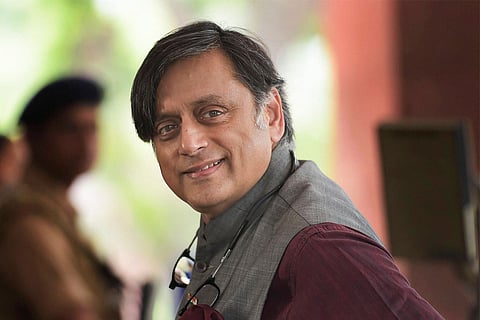

Author, Thiruvananthapuram MP and Congress leader Shashi Tharoor has often made news for his English. The polysyllabic and difficult to pronounce words in his tweets have led to much mirth on social media, and the politician even did a stand-up special with his English as the subject.
Now, Tharoor has written a new book titled Tharoorosaurus, published by Penguin Randomhouse, which has 53 unusual words. Each word comes with its etymology or history and is accompanied by a witty example of its usage.
In an email interview with TNM, Tharoor talks about his book, how he managed to build his formidable vocabulary and of course, politics.
Never! I have been amazed by the reaction to some of the language I have used at times, and certainly didn’t expect things to go as far as they have. It’s not as if I ever went out of my way to develop a reputation for having an obscure vocabulary. I have used odd words in a few of my tweets – “farrago”, or “rodomontade” – but that has been for fun, rather than as any reflection of how I actually speak. Some people assume that my daily vocabulary is that of some sort of walking Thesaurus – definitely not!
I am glad though that the reaction seems to indicate that people are interested in language and words. If it encourages at least a few people to start reading, I’ll consider the whole thing a great success.
Anyone who is interested in words – readers, writers, anyone curious about the power of language. Certainly, for anyone suffering from the infamous condition hippopotomonstrosesquipedaliophobia – I would hope this book acts as a sort of cure!
To be clear, I was never one to burn the midnight oil studying dictionaries! Words do not fascinate me on their own – it is rather what they can express that makes them so powerful and important. Learning new words has always been an organic process rather than something I actively set out to do, and came about primarily as a result of being a voracious reader. This is something that still holds true today.
It is sometimes fun to use complex, obscure words to add flavour to writing. However, I would advise writers to, in general, follow George Orwell’s rule: never use a long word where a short one will do. Writing is best when it is direct, clear, and concise. That being said, each writer should find their own style – use words that work best for you!
About a year. It helped that I had a weekly “Word of the Week” column in a daily newspaper during that time, though most of the entries are revised and expanded from what I wrote there. But that gave me the incentive to churn out a word a week.
I am not a fan of rote learning – as I said, my own vocabulary was expanded purely by reading far and wide, anything I could get my hands on. When you see words that are common to various books you are reading, you start to get an idea of what they might mean, and how to use them. Schoolchildren of the world, if you wish to learn more words, use this book as one possible source, but in general read as much as you can – not dictionaries and thesauruses, but real books! Memorising words is not much use – appreciating their meaning and use is far more useful to reading, which to me is one of the best ways to spend one’s time.
Oh, plenty of times – every word was at some point encountered for the first time, of course. In fact, your first question contained a word that I and much of the world became familiar with only recently: meme! The most amazing thing about any language is the rate at which it evolves – so it’s always a treat to come across unfamiliar words. That is, by definition, the only way to expand one’s vocabulary and one’s mind. But I tend to understand them from context rather than trotting over to a dictionary.
I generally welcomed the NEP, though I do question why it was not brought before Parliament first, considering that Parliament is the basis of our great democracy. It sets out some important goals and seems to have taken into account suggestions that many of us have been making.
I do have some concerns, however. Although it outlines that 6% of GDP will be spent on education, this is a goal first articulated in 1948, and the Modi government has seen real spending on education decline, so I am sceptical as to the government’s commitment to that target. The same goes for its plans to increase enrolment in higher education institutions and secondary schools. In general, the NEP appears to centralise education policy, has lofty goals with little likelihood of reaching them, and suggests that much of its plans are to be met by the private sector, which is unlikely to ensure that the poor can afford whatever programs it institutes.
I think the solution to the three-language formula is not to abandon it, but to ensure its better implementation, which has not been done since its institution in the 1960s. As I have pointed out, most of us in the South learn Hindi as a second language, but no Northerner is learning Malayalam or Tamil!
a. Narendra Modi: divider
b. Rahul Gandhi: idealistic.
c. The state of the Congress: redeemable.
d. CPI(M): frustrating.
e. Controversy: unavoidable!